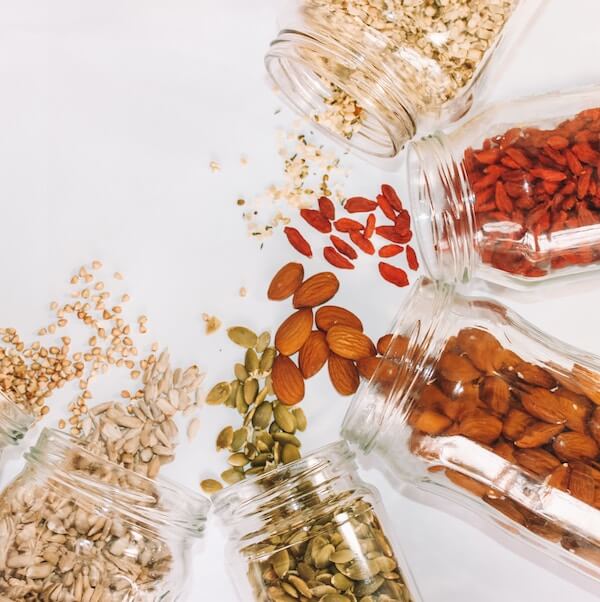
Recently you may have noticed more people you know have gone gluten-free. You have a friend with celiac disease who avoids gluten because they get really, really sick when a crumb is near them. You also have a friend who avoids bread and pasta because, well, it just makes her feel better not eating them! Should you consider giving up gluten too? Explore Gluten Supplements from YouVeda.
What is gluten?
Gluten is an elastic-like protein such as glutenin and gliadin, which are wondrous for rising bread and binding dough.
You can even buy gluten in a powdered form – vital wheat gluten – and add it to dishes for help with rising, a longer shelf-life, and an airy, chewy effect.
Gluten is mostly found in the proteins of barley, wheat, and rye.
Besides the obvious bread, other processed foods may have added gluten, like soup, salad dressings, and sauces.
Signs of Gluten Intolerance
Gluten helps stick everything together. What do you think it does when your tummy tries to break it down?
After eating gluten, people with an intolerance may experience:
- Bloating
- Chronic Fatigue
- Numbness in the fingers and feet
- Severe abdominal pain
- Diarrhea or constipation
- Unexplained fertility, low bone density
- Joint pain
- Brain fog
- Stress, due to an imbalance of microbes in our “belly-brain”
Celiac Disease Vs. Gluten Sensitivity
There is a difference between mild intolerances and Celiac disease.
Celiac disease is an autoimmune disease where the body begins to destroy itself when gluten has been ingested. People with this disease may be bed-ridden for days after exposure to gluten, with stomach pains, migraines, feeling weak, etc.
They don’t necessarily have to ingest gluten for things to go downhill – something as innocent as their roommate forgetting to clean the counter after their carb-loaded feast will put them down.
On the other hand, people with intolerances may have some of the above symptoms, but certainly not to the degree as someone with Celiac disease.
Also, when considering if you’re sensitive to gluten, look at your diet as a whole. Was it a handful of cookies that didn’t make you feel good, or one slice of local sourdough bread?
How Common is a Gluten Intolerance?
According to the Gluten Intolerance Group, only about 1% of the population has Celiac disease. Extensive testing is needed to be diagnosed for this condition, like blood tests and an endoscopy.
They also predict that only 17% of people who have Celiac disease know it.
According to US News, 6% of the population has a gluten intolerance.
Approximately 30% of Americans try to avoid gluten, and 67% of people believe that eating a gluten-free diet is healthier.
What do you think? Is a gluten-free diet healthier? Do you feel better when you avoid foods with gluten?
White-flour brownies, bread, and pasta all include gluten. This could be what people think when they hear “gluten”. It is important to look at your diet as a whole before putting all of the blame on gluten.

Gluten Alternatives
Whether you don’t feel well after a hearty loaf of bread dipped in your soup, you’re looking to lose weight by cutting out carbs, you have Celiac disease or any other reason… here are a few items to swap out in your pantry to live a gluten-free life:
- Flour – try oat flour, chickpea flour, buckwheat flour, amaranth flour… there is an entire slew of gluten-free flours! It’s fun to combine a few different flours to see what works. A helpful tip – add a bit more water to help bind!
- Pasta – there are so many fun new bean pasta to try! Like pasta made from lentils, chickpeas, rice. Other alternatives are rice, quinoa, millet, buckwheat, and farro.
- Beer – gluten-free beer, of course!
- Bread – gluten-free bread, or have fun making your own with the above-mentioned flours!
- Cookies – make your own, or shop the gluten-free aisle in your local grocery store.
With more and more people testing the waters in the world of no-gluten, there are many options to alter your diet.
Ayurveda and Gluten Intolerances
Worried about missing chunks of nutrition by skimping on the glutenous foods?
There’s no need – you don’t need to totally alter your diet to avoid gluten!
Eating for your particular body type and needs is exactly what the ancient “science part of yoga” aims to do.
Whether you are a vata, pitta or kapha, following an Ayurvedic meal plan nourishes your body with all the right foods, leaving you feeling fresh and fulfilled.
We hope that your belly and brain feel good with your food choices, gluten-free or not!
Gluten Supplements from YouVeda
To nourish yourself more, check out some of You Veda’s supplements. Some gluten-free options are My Healthy Mood to decrease stress and My Healthy Joints to strengthen your body!





